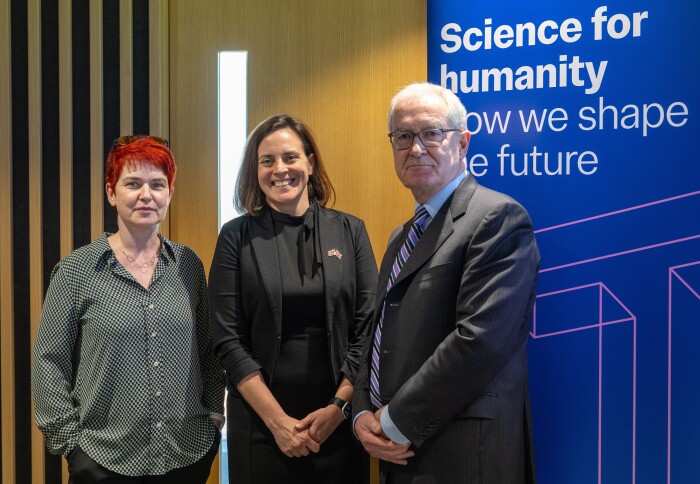US health research agency ARPA-H sets out funding vision during Imperial visit

The US government biomedical and health research funding agency set out its vision during a visit to Imperial's White City Deep Tech Campus.
Dr Renee Wegrzyn, the Director of the Advanced Research Projects Agency for Health (ARPA-H), emphasised the importance of working with global partners and said that funding was open to scientists from Imperial, the UK and around the world.
“We are completely open for global funding. One of the reasons the UK is our first visit is the incredible innovation happening." Dr Renee Wegrzyn Director of ARPA-H
Speaking at a special Q&A event with Imperial’s Vice Provost (Research and Enterprise) Professor Mary Ryan, Dr Wegrzyn explained how the agency is taking on high-risk, high-reward innovation and the importance of international research cooperation to amplify these efforts to improve health outcomes for all.
The agency, which was set up in 2022, is seeking expertise and collaborations from Imperial, the UK and around the world to solve some of the toughest challenges in health.
Dr Wegrzyn – who was visiting Imperial during her first international trip in the role – was hosted by Imperial’s President Professor Hugh Brady, who outlined some of the exciting research and projects taking place at the White City Deep Tech Campus.
Dr Wegrzyn said: “We are completely open for global funding. One of the reasons the UK is our first visit is the incredible innovation happening and multidisciplinary nature of the work, and the assets here such as national health data, so there’s really an advantage for us to collaborate."
ARPA-H seeks to invest in innovations and technologies that will transform the future of health.
“We also have the power to convene federal regulators and help you through that process and bring experts to the table to remove blockers to get things to marketplace," Dr Wegrzyn explained.

Some of the bold, high-risk investments that ARPA-H has taken on include programs to enable whole eye transplantations and capabilities to change the trajectory of women’s health research.
President Brady said: "The US Government’s commitment to fund pioneering research and innovation in human health through ARPA-H is impressive and adds to the longstanding efforts of the NIH and other funding agencies.
"We were delighted to host the ARPA-H leadership at Imperial’s White City Deep Tech Campus which is home to more than 2,000 scientists, clinicians and engineers applying convergence science approaches to tackle real world challenges.
"The US is one of our most important and longstanding collaborators and we look forward to exploring ambitious projects and making exciting new discoveries together."
The visit was held at the Sir Michael Uren Hub and I-HUB based at Imperial’s White City Deep Tech Campus. The Uren Hub comprises of state-of-the-art laboratory and office facilities for the next generation of biomedical engineering research across technology and application themes.
The ARPA-H Director toured some of the laboratory facilities and learned how Imperial is supporting entrepreneurs through programmes such as MedTechONE.
The ARPA-H delegation also met with leaders and academics from the university working in health, biology, innovation and artificial intelligence. Imperial and partners in the US have many rapidly accelerating collaborations in these areas.
Imperial's world-leading engineers are helping to solve many of the challenges facing society, from healthcare to sustainable energy. The Director heard about some of their ground-breaking research in synthetic biology, synthetic genome engineering and chemical engineering.
The ARPA-H Director also met some of Imperial's AI experts who are playing a leading role in transforming healthcare. Our researchers are developing AI-based diagnostics and digital biomarkers, making healthcare provision more efficient and effective by increasing productivity, and accelerating the discovery of new drugs, disease mechanisms, and treatment pathways.
Some of Imperial’s innovative biotech startups and spinouts also showcased their projects to the Director and APRA-H leaders. These included projects such as RNA vaccines and therapeutics, and regenerative cell therapy for heart failure.
Imperial’s White City Deep Tech Campus

Imperial’s White City Deep Tech Campus is home to more than 2,000 scientists, clinicians and engineers.
A key part of the WestTech Corridor, it brings academia and business together on an unprecedented scale, creating a network of innovation spaces for businesses of all sizes and supporting enterprising talented staff and students to incubate and scale their cutting-edge research.
Imperial’s WestTech Corridor capitalises on a number of world-leading assets such as the rapidly growing Paddington Life Sciences innovation cluster centred around Imperial’s St Mary’s Hospital Campus, Imperial’s White City Deep Tech Campus and Hammersmith Hospital Campus, and Imperial’s South Kensington Campus.
.
Article text (excluding photos or graphics) © Imperial College London.
Photos and graphics subject to third party copyright used with permission or © Imperial College London.
Reporter
Stephen Johns
Communications Division
